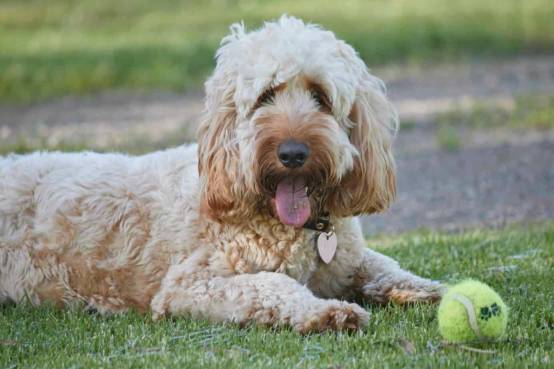Connect with a verified veterinarian in minutes. Licensed vets are available 24/7 to answer your questions. No need to worry about your furry family member.
Have you noticed the fur around your dog’s muzzle changing to gray? Has he started slowing down a little bit? These are normal parts of aging in a dog. Just like we humans, dogs go through different physical and mental changes as they age.
Learning what’s normal as your dog ages helps you to monitor him for any changes that are concerning. You can also learn about symptoms that may indicate your dog has a health issue and when to see the vet.
In this article, we’ll go over some of the health problems older dogs can develop. Let’s get started!
1). Increased and/or Strained Urination
When a dog has increase and/or strained urination issues, this could be a sign that he has developed kidney disease or a urinary tract infection. These conditions are more common in dogs that are in their middle and senior years.
Kidney disease and urinary tract infections are usually treatable with medications and/or dietary changes. If you suspect your dog has this type of health issue, then call the vet right away. These types of health problems can only be treated by a veterinarian.
2). Weight Loss or Gain
Sometimes older dogs have a hard time keeping their weight at the same level. They may gain or lose weight. Weight issues are a sign that your dog has a health condition that must be checked by the vet.
Dogs that are too heavy can develop heart problems, diabetes, joint problems, and more. And dogs who are underweight can also suffer from certain health issues.
So, if your dog is having a weight problem, then it’s time for a checkup with the vet. Depending on the vet’s diagnosis, they may suggest putting your dog on dog food that has more calories (if your dog has lost weight and there is no underlying health condition). For dogs who are overweight, it may be necessary to choose a food for senior dogs that has fewer calories but all the nutrition your dog needs.
For dogs who are overweight but older, you may want to ask the vet about an exercise routine. With the right amount of exercise and a healthy diet, your older dog will be able to better manage his weight. He’ll also be able to keep other serious health issues from starting.

Review symptoms, medications & behavior to keep your pets healthy with a Vet Online in just minutes.
Ask a Vet Live Now3). Behavior & Memory Issues
As dogs age, their brains also go through changes. There is a form of canine dementia called canine cognitive dysfunction.
Dogs with canine dementia may become disoriented, not remember where they are, bark or whine for no reason, and more. If you notice your dog seems to be forgetful, he’s awake most of the night, he’s having potty accidents, and more, then it’s time to call the vet.
While’s there no cure for canine dementia, there are medications that can help slow the development of the condition. There are also supplements that help improve brain function with antioxidants.
4). Mobility & Joint Issues
Another normal part of the aging process is the development of arthritis in dogs. This condition usually affects the joints that are weight-bearing, including the elbows, hips, and shoulders. Arthritis causes joints to lose lubrication, wears away cartilage, and causes bones to grow abnormally. All of this can cause stiffness and pain in the joints, as well as decreased range of motion. Dogs with arthritis may develop mobility issues as a result of this painful condition.
If you notice your dog seems to have painful joints and is having more difficulty getting around, then it’s time to call the vet. There are some medications that can slow the progression of arthritis, as well as treat the pain and stiffness brought on by the disease.
5). Vision & Hearing Loss
Hearing and vision loss are other problems that dogs (and their humans) may face as they age. Vision and hearing problems may develop as a result of tissue degeneration in the eyes and ears. What’s more, older dogs are also more prone to developing cataracts. This condition can cause a cloudy layer to form over the lens of the eye. This can lead to partial or complete blindness. Cataracts may be fixed by surgery.
Hearing loss, on the other hand, usually isn’t treatable in older dogs. Hearing issues may come on gradually and eventually lead to complete deafness.
If your dog shows any sign of hearing or vision issues, then it’s time to have him checked by the vet. The vet may be able to treat these issues with medications or surgery.
6). Heart Problems
Heart disease is also another health issue that some older dogs develop. One of the most common forms of heart disease in older dogs is congestive heart failure. The heart is not able to efficiently pump blood, which causes fluid to back up in the heart, lungs, and chest cavity.
Dogs who have developed congestive heart failure may develop a cough, have difficulty breathing, not be able to exercise, lose consciousness, and may experience bouts of vomiting that seem to have no cause.
If your dog shows these types of symptoms, then it’s time to call the vet. There may be some medications that can help your dog to feel a little better.
7). Tumors & Growths
Older dogs also have a tendency to develop bumps and lumps as they age. Any bumps and lumps your dog develops should be checked by a vet to make sure they are not cancerous. The good news is that most lumps and bumps in older dogs are benign, but only a vet can determine whether or not this is the case.
If your dog has lumps and bumps, especially new ones, then be sure to get an appointment with the vet. If they are cancerous, the sooner these are treated, the better.
These are some of the most common health issues in older dogs. If your senior dog develops any of the symptoms mentioned here, or other concerning symptoms, then be sure to call the vet for an appointment. This is the best way to keep your older dog healthy and help him live a longer, happier life.
Connect with a verified veterinarian in minutes. Licensed vets are available 24/7 to answer your questions. No need to worry about your furry family member.

Kyoko
Kyoko is from a family of 3 and moved to New York with her parents and siblings when she was 13. Kyoko is fond of spending a great amount of time with pets, specifically her beagle Luna and cat Missy. Her boyfriend often complains that she spends too much time giving attention to their animals. Kyoko has written dozens of articles concerning pets and is aiming at owning a pet shop one day!
Review symptoms, medications & behavior to keep your pets healthy with a Vet Online in just minutes.
Ask a Vet Live Now




